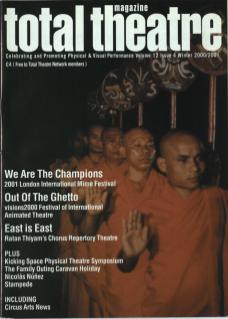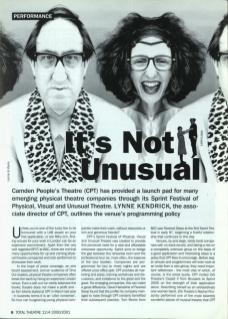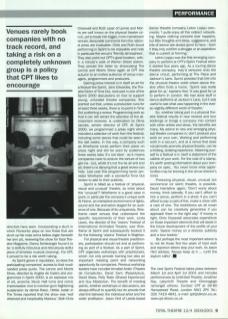Unless you're one of the lucky few to be honoured with a LAB award on your first application, or are filthy rich, finding venues for your work in London can be an expensive commitment. Apart from the very well regarded BFVT at BAC, there are not that many opportunities for up and coming physical theatre companies and solo performers to showcase their work.
In the hope of press coverage, an arts board assessment, and an audience of Time Out readers, physical theatre companies often break the bank by hiring an expensive London venue. Even a sell-out run rarely balances the books; theatre does not make a profit and – as Tom Morris stated at CPT in March last year – in business terms it is an 'utter nonsense'. So how can burgeoning young physical companies make their mark, without resources or rich and generous friends?
CPT's Sprint Festival of Physical, Visual and Unusual Theatre was created to provide this perceived need for a vital and affordable showcase opportunity. Sprint aims to bridge the gap between the rehearsal room and the professional tour (or, more often, the expense of the tour booker). Companies are programmed for two to three nights and are offered a box office split. CPT provides all marketing and press, training workshops and discussions, and invitations to the great and the good. For emerging companies, this can make a great difference. David Harradine of Fevered Sleep found that the profile his company managed to raise through CPT certainly benefited their subsequent practice. Tom Morris from BAC saw Fevered Sleep at the first Sprint Festival in early 97, beginning a fruitful relationship that continues to this day.
Venues, by and large, rarely book companies with no track record, and taking a risk on a completely unknown group on the basis of a good application and interesting ideas is a policy that CPT likes to encourage. Before larger venues and programmers will even look at an invite from a new group, they need important references – the most vital of which, of course, is the press quote. CPT invited Zirk Theatre's Carpet II from Brussels to Sprint 2 on the strength of their application alone. Describing herself as an extraordinary one-woman band, Zirk Theatre's Rachel Ponsonby performed one of the most bizarrely wonderful pieces of musical theatre that CPT directors have seen. Incorporating a stunt in which Ponsonby plays on two flutes that are stuck up her nose and a bellow organ beneath her arm pit, reviewing the show for Total Theatre Magazine, Danny Schlesinger found it to be 'a skilfully ridiculous and ridiculously skilful piece of timeless musical clowning'. For CPT, it proved to be a risk worth taking,
As Sprint grows in reputation, so does the participating companies' access to that much needed press quote. The Lennie and Morris Show, directed by Angela de Castro and programmed in Sprint 2000, is an explosive mix of wit, anarchic Music Hall turns and comic improvisation (not to mention gum-frightening suspension by dental floss). Hettie Judah in The Times reported that the show was 'well observed and inexplicably hilarious'. Both Chris Cresswell and Ruth Laser of Lennie and Morris are well known on the physical theatre circuit, yet to break into bigger, more mainstream venues, favourable comments from the national press are invaluable. Chris and Ruth found performing in Sprint to be enjoyable and note in particular ‘the venue's friendly atmosphere'. They also point out CPT's good location, within a minute's walk of Warren Street station. They proved the latter by showcasing The Lennie and Morris Show again at CPT this autumn to an invited audience of venue managers, programmers and producers.
Gaining press interest is in itself an art for a festival like Sprint. Jane Edwardes, the Theatre Editor of Time Out, took part in one of the Sprint 2000 discussions on how to support young, unfunded theatre companies. She pointed out that, unless a production runs for at least three weeks, there is no point in Time Out publishing a review. Programming work so that it can still attract the attention of the all-important reviewer, is undertaken by Olivia Jacobs, artistic director of CPT. At Sprint 2000, we programmed a press night which included a selection of work from the festival, including some pieces that could be seen in the last weeks. In this way, a company such as Wireframe could perform their piece on press night and still be seen by audiences three weeks later. It's not ideal – as it means companies have to endure the torture of two get-ins – but, whilst it's not the be all and end all, there's no denying that a great review can help. Last year this programming tactic provided Wireframe with a wonderful Time Out review to add to their publicity.
Sprint is billed as a festival of physical, visual and unusual theatre, so what about the 'unusual? Wireframe is a good case in point, in particular the company's unique work At Home, an interactive environment of lights, sound and live animation staged for an audience of one. Because of its uniqueness, Wireframe need venues that understand the specific requirements of their work. Linda Lewis, the director of the 'visions' Festival of International Animated Theatre, saw Wireframe at Sprint and subsequently booked it for the following 'visions' Festival in Brighton.
For physical and visual theatre practitioners, participation should not end at performing as part of a festival. As a part of Sprint, CPT organises workshops with practitioners, which not only provide training but also an important meeting point and networking opportunity for companies. Previous workshop leaders have included Annabel Arden (Theatre de Complicite), David Sant (Peepolykus), David Glass, Polly Teale (Shared Experience) and Guy Masterson. The benefit of meeting points, whether workshops or discussions, are always difficult to quantify but do provide that vital link between the individual artist and the wider profession. Jason Hird of Leeds-based dance theatre company Leikin Loppu comments: 'I quite enjoy all this indirect networking. Maybe nothing concrete ever happens, but little thoughts and ideas, suggestions, and bits of advice are always good to have – even if they only confirm a struggle or an aspiration that is current or forming.’
Leikin Loppu was the first emerging company to perform at CPT's Sprint Festival when it started four years ago. As a touring dance theatre company, they'd ventured onto the dance circuit, performing at The Place and Jacksons Lane. Sprint provided that link into the physical theatre world where dance theatre often finds a home. 'Sprint was really great for us,' explains Hird. 'It was good for us to perform in London. We had done stuff in dance platforms at Jackson's Lane, but it was useful to see what was happening in the ever-so-slightly different world of theatre.’
So, whether taking part in a physical theatre festival results in rave reviews and tour bookings or brings a company into contact with other artists and ideas, the benefits are many. My advice to new and emerging physical theatre companies is: don't produce your work on your own. Working and performing work in a vacuum, and at a venue that does not primarily promote physical theatre, can be a limiting, isolating experience. Attaching yourself to a festival is in itself a statement of the calibre of your work. For the cost of a stamp, it's worth posting information about your company on spec. You never know what opportunities may be brewing in the venue director's mind.
Producing physical, visual, unusual but economical (or skint) theatre, is possible. David Harradine again: 'Don't worry about money, think laterally. If you can't afford to hire a venue, perform in a shed; if you can't afford to pay a cast of five, make a show with a cast of one. The restrictions we all moan about can be creatively generative if you approach them in the night way.' If money is tight, Chris Cresswell advocates expenditure on those important elements that will assist in the future development of the profile of your work: 'Spend money on a director, publicity and a tour booker.'
But perhaps the most important advice is to not let those first few years of hard work and rejection letters stop your work. As Jason Hird advises: ‘Always keep at it... (until the asylum calls).’
The next Sprint Festival takes place between 1 March and 1 April 2001 and includes performances by Unlimited Theatre, Jonathan Kay, Labyrinth Theatre and Clownagogo (amongst others).


